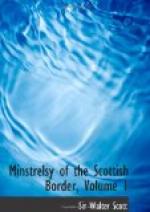[Footnote 180: The original editor of the Reliques of Ancient Poetry has noticed the perfidy of this clan in another instance; the delivery of the banished Earl of Northumberland into the hands of the Scottish regent, by Hector of Harelaw, an Armstrong, with whom he had taken refuge.—Reliques of Ancient Poetry, Vol. I. p. 283. This Hector of Harelaw seems to have been an Englishman, or under English assurance; for he is one of those, against whom bills were exhibited, by the Scottish commissioners, to the lord-bishop of Carlisle.—Introduction to the History of Westmoreland and Cumberland, p. 81. In the list of borderers, 1597, Hector of Harelaw, with the Griefs and Cuts of Harelaw, also figures as an inhabitant of the Debateable Land. It would appear, from a spirited invective in the Maitland MSS. against the regent, and those who delivered up the unfortunate earl to Elizabeth, that Hector had been guilty of this treachery, to redeem the pledge which had been exacted from him for his peaceable demeanour. The poet says, that the perfidy of Morton and Lochlevin was worse than even that of—
—the traitour Eckie of Harelaw, That says he sould him to redeem his pledge; Your deed is war, as all the world does know— You nothing can but covatice alledge.
Pinkerton’s Maitland Poems, Vol. II. p. 290.
Eckie is the contraction of Hector among the vulgar.
These little memoranda may serve still farther to illustrate the beautiful ballads, upon that subject, published in the Reliques.]
Kershope-burn, where Hobbie met his treacherous companions, falls into the Liddel, from the English side, at a place called Turnersholm, where, according to tradition, turneys and games of chivalry were often solemnized. The Mains was anciently a border-keep, near Castletoun, on the north side of the Liddel, but is now totally demolished.
Askerton is an old castle, now ruinous, situated in the wilds of Cumberland, about seventeen miles north-east of Carlisle, amidst that mountainous and desolate tract of country, bordering upon Liddesdale, emphatically termed the Waste of Bewcastle. Conscouthart Green, and Rodric-haugh, and the Foulbogshiel, are the names of places in the same wilds, through which the Scottish plunderers generally made their raids upon England; as appears from the following passage in a letter from William, Lord Dacre, to Cardinal Wolsey, 18th July, 1528; Appendix to Pinkerton’s Scotland, v. 12, No. XIX. “Like it also your grace, seeing the disordour within Scotlaund, and that all the mysguyded men, borderers of the same, inhabiting within Eskdale, Ewsdale, Walghopedale, Liddesdale, and a part of Tividale, foranempt Bewcastelldale, and a part of the middle marches of this the king’s bordours, entres not this west and middle marches, to do any attemptate to the king our said soveraine’s subjects: but thaye come throrow Bewcastelldale, and retornes, for the most part, the same waye agayne.”




